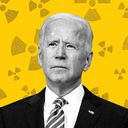Nuclear challenges from Russia, Iran and North Korea now fall to Biden

Published Date: 11/12/2020
Source: axios.com
Joe Biden will face three urgent nuclear challenges upon entering the White House.Why it matters: Arms control with Russia is crumbling, Iran’s uranium stockpiles are growing, and North Korea is as vexing and threatening as ever.The last treaty constraining the world's two nuclear superpowers, New START, is due to expire 15 days after Biden takes office.President Trump was skeptical of that Obama-era deal, but both Biden and Russia's Vladimir Putin want to activate a five-year extension. Their approval and a bit of protocol are all that’s required.That will avert an immediate arms race. It won’t address Russia’s new weapons systems and smaller "tactical" nukes — not to mention China’s unconstrained nuclear buildup.The Trump administration pushed a proposal for the "future of arms control," involving both Russia and China, but it arrived to the issue late and didn't get very far.The state of play: Biden sees New START, once extended, as the "foundation for new arms control arrangements." But in a climate of distrust with Moscow and Beijing — and with a plethora of competing priorities — he might struggle to break much more new ground than Trump did.Biden also wants to move quickly to salvage the Iran nuclear deal — promising to re-enter it by lifting sanctions if Iran returns to compliance.Iranian leaders have said they’d hold up their end of that deal. But they want the U.S. to make the first move and have waved away the idea of a broader, longer-lasting deal, which is Biden's ultimate objective.The UN’s nuclear watchdog also revealed this week that Iran's stockpile of low-enriched uranium is currently 12 times what is permissible under the deal. Iran has also advanced its nuclear research and updated its facilities since Trump withdrew in 2018.The Trump administration, meanwhile, is attempting to block the path back to the deal by piling on new non-nuclear sanctions that Biden might find politically tricky to lift.What to watch: Negotiations on a follow-on deal will probably have to wait for Iran to elect its next president in June.Trump will soon hand back the challenge Barack Obama said would be the most difficult of his presidency: North Korea.Where things stand: Besides parading a giant new missile through Pyongyang last month, Kim Jong-un has gone relatively quiet. Things won't stay that way.North Korea has a history of testing incoming U.S. administrations, and Kim has been clear that his suspensions of nuclear and long-range missile tests were only temporary.The leaders aren’t starting on great terms. Biden called Kim a “thug” during the campaign, while North Korea labeled Biden a “rabid dog.”Biden has proposed a bottom-up approach to negotiations, while working in conjunction with U.S. allies as well as China to apply pressure on Kim’s regime. In the meantime, North Korea's nuclear capabilities will continue to advance.The bottom line: North Korea might be Biden's most difficult foreign policy challenge too.Go deeper: How Biden might tackle the Iran dealTrump leaves Biden tough choices on ChinaThe world prepares for Biden